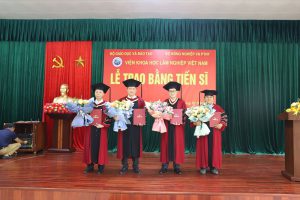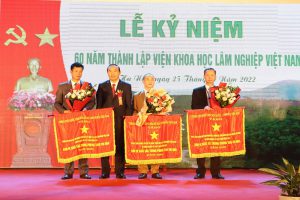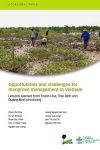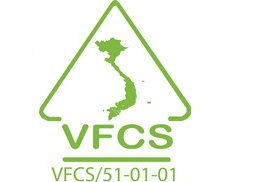VIETNAMESE ACADEMY OF FOREST SCIENCES (VAFS)
Add: Dong Ngac Commune – Tu Liem District – Hanoi, Vietnam
Tel: 84- 4- 38389031 Fax: 84 -4- 38389722
E-mail: vkhln@hn.vnn.vn Website: www.vafs.gov.vn

The Forest Research Institute was precursor of the Forest Science Institute of Vietnam, which was established in 1961. The Forest Research Institute developed from 1961 to 1971, then divided in to three institutes (Forestry Institute 1972-1988, Forest Industry Institute 1974-1988, and Forest Economic Institute 1981-1988); and finally consolidated in to The Forest Science Institute of Vietnam from 1988 to now.
On Nov. 25th 2011, the Prime Minister issued Decision No. 2099/QĐ-TTg on the structure and operation of the Vietnamese Academy of Forest
Sciences (VAFS) as a special scientific organization under the Ministry of Agriculture and Rural Development (MARD). The MARD promulgated Decision No. 1149/QĐ-BNN-TCCB dated May 18th 2012 on stipulating functions, duties, powers and organizational structure of VAFS and Decision No. 1656/QĐ-BNN-TCCB dated July 16th 2012 on stipulating the regulations and the operation of the Vietnamese Academy of Forest Sciences.
VAFS’S ROLE
1. Function
Implementing scientific research, technology transfer, post-graduate training, international cooperation, advisory services and business regarding forest research, development and extension in Vietnam.
2. Tasks
a) Advising the Minister on the strategic direction of forest research for the long term, including a five year plan, and for annual program to address identified forestry issues requiring research, technological development and implementing of these approved programs/projects.
b) Basic and applied research in various fields of forest science including:
– Silviculture and ecology of the tropical forests of Vietnam;
– Techniques and technologies for planting, rehabilitation, enrichment, improvement, and promotion of natural regeneration for the sustainable management of Vietnam’s forest resources;
– Processes for the conservation of genetic improvement of native plants and native animals;
– Tree breeding to improve forest genetics, including management of seed orchards and seed stands, selection of forest seed, storage and preservation of seeds;
– Improving and applying bio-technology in forestry;
– Determining the physiological and ecological characteristics of individuals and populations of forest plants; developing forest ecological restoration methods and the protection and conservation the specific forest ecosystems;
– Development of methods for sustainable forest land use;
– Evaluation and prediction of the environmental impact on forests of climate change and environmental monitoring;
– Operational techniques for cultivating, planting, harvesting, processing and preservation of non-timber forest products;
– Forest protection processes to minimize or reduce the impacts of pests, insects and fire on forests;
– Developing forest policy with respect to forest economics, natural resource management, environmental protection, marketing of forest products and the socio-economic benefits for forest dependent communities;
– Developing and mechanizing producing systems for forest nurseries, field operations including planting, managing, harvesting and transportation, and for the processing and preserving forest products.
c) Conducting key scientific and technological studies at a National level
d) Evaluating technologies and economic key state-level forestry projects.
e) Developing technologies in forestry.
f) Developing national prescriptions, procedures, economic and technical standards and economic evaluations related to forestry.
g) Post-graduate training Doctoral and Master’s candidates, and improving the human resources in forest science in accordance.
h) International cooperation and membership of organizations involved in scientific forestry research and developing networks with similar organizations and their scientists.
i) Technology transfer and extension of research results for practical application in forestry and natural resource management.
j) Undertaking consultancies as required.
k) Assessing, monitoring and evaluating programs.
l) Publication of books, journals, of a scientific, technological and environmental nature for wider circulation of information, and the maintenance of a website.
m) Undertaking the duties relating to CITES.


ORGANIZATIONAL STRUCTURE
VAFS has 477 staff, including 6 Associate Professors, 1 Doctor of Science, 31 PhDs, 40 PhD. candidates, 100 Masters of Science and Master of Science candidates, and 230 Engineers and University graduates.
VAFS comprises 4 administrative departments, 4 research institutes, 3 research centres, 2 regional institutes and 4 regional centres.
|
No |
Name |
Office |
Tel / Fax |
|
A |
Administration Department (4) |
||
|
1 |
Personnel |
Dong Ngac – Tu Liem – Ha Noi |
0438.389031 0438.389722 |
|
2 |
Science |
Dong Ngac – Tu Liem – Ha Noi |
0438.389721 |
|
3 |
Post-graduate |
Dong Ngac – Tu Liem – Ha Noi |
0438.362232 |
|
4 |
Finance |
Dong Ngac – Tu Liem – Ha Noi |
0438.362233 |
|
B |
Research Institutes and Centres (7): |
||
|
1 |
Silvicultural |
Dong Ngac – Tu Liem – Ha Noi |
0438.362229 |
|
2 |
Forest Industry Research Institute (FIRI) |
Dong Ngac – Tu Liem – Ha Noi |
0437.520027 0438.387179 |
|
3 |
Forest Tree Improvement and Biotechnology Research Institute (FTIBRI) |
Dong Ngac – Tu Liem – Ha Noi |
0438.389813 0438.362280 |
|
4 |
Forest Ecology and Environment Research Institute(FEERI) |
Dong Ngac – Tu Liem – Ha Noi |
0438.389434 0438.389434 |
|
5 |
Forestry |
Dong Ngac – Tu Liem – Ha Noi |
0438.362230 |
|
6 |
Forest Protection Research Centre (FPRC) |
Dong Ngac – Tu Liem – Ha Noi |
0438.362376 |
|
7 |
Non-Timber Forest Products Research Centre (NTFPRC) |
8- Chuong |
0438.269771 0438.269771 |
|
C |
Regional Institutes and Centres (6): |
||
|
1 |
Forest Science Institute of South Vietnam (FSISV) |
1 Pham Van |
0838.441496 0838.448690 |
|
2 |
Forest Science Institute of Central Highlands and South of Central Vietnam (FSICHSCV) |
9 – 11, Hung |
0638.29852 |
|
3 |
Forest |
614 Le |
02238.51264 02238.53283 |
|
4 |
Forest |
Chan |
021038.35031 021038.35031 |
|
5 |
Forest |
Ngoc |
021138.56022 021138.56061 |
|
6 |
Forest |
273 Le Duan Street – Dong Ha |
0533.582.657 0533.852.998 |
INFRASTRUCTURE AND TECHNICAL FACILITIES
* Laboratories
– Forest tree improvement and tissue culture laboratory
– Forest tree diseases and insect pest laboratory
– Forest soil, plant analysis and forest environment laboratory
– Wood and forest products preservation laboratory
– Wood anatomy and wood mechanical and physical properties laboratory.
– Wood processing and forest engineering laboratory.
* Information resources
– Specialized library with about 20,000 copies of books and journals covering scientific and technical fields of forestry: Silviculture, forest industry, forest economics in various languages: Russian, English, French, German, Chinese, Spanish.
– Internet, Website, LAN.
– Database on books in the VAFS library and forest research results and forest projects in Vietnam
* Research sites
– Research sites under VAFS management are located at the Centres with the total area of over 11,000 ha of which 1,500 ha is natural broad-leaved evergeen forest.
– In addition there are other sites for joint research with various production units and National Parks.
INTERNATIONAL RELATION
– The Vietnamese Academy of Forest Science is a member of IUFRO and APAFRI.
– Relationships have also been established with many international organizations, including forest organizations of the Asia-Pacific region, and forest research institutes in many countries such as FAO, ICRAF, WB, IPGRI, JICA, JOFCA, KOICA, IUCN, DANIDA, CSIRO, ACIAR, AVI, PI, Oxfarm, Tropenbos, SIDA, GIZ, INBAR, FRIM, SIDA, CIFOR, China, Czech Republic, The Netherlands, Australia, etc.


Latest news
- Project: "Research on improving the economic efficiency of plantation timber value chains, meeting legal timber requirements and sustainable forest management"
- Project: Commercial-scale yield trial and completion of planting techniques for newly recognized acacia hybrid cultivars (BV586, BV376, BB055, BV584, BV523, BV434, BV350)
- Project: Study on technology of producing hollow veneer-based composite used in construction and interior wooden furniture
- VFCS is published on the website of the Forestry Department, Ministry of Agriculture, Forestry and Fisheries of Japan
- Memorandum of Understanding signing ceremony on handing over new wood material samples from the Finnish Embassy to the VAFS for displaying






